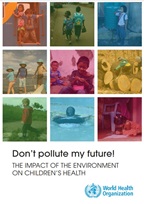Pneumonia
Pneumonia is a form of acute respiratory infection that is most commonly caused by viruses or bacteria. It can cause mild to life-threatening illness in people of all ages, however it is the single largest infectious cause of death in children worldwide.
Pneumonia killed more than 808 000 children under the age of 5 in 2017, accounting for 15% of all deaths of children under 5 years. People at-risk for pneumonia also include adults over the age of 65 and people with preexisting health problems.
The lungs are made up of small sacs called alveoli, which fill with air when a healthy person breathes. When an individual has pneumonia, the alveoli are filled with pus and fluid, which makes breathing painful and limits oxygen intake. These infections are generally spread by direct contact with infected people.
Vaccines can help prevent pneumonia.
Depending on the severity of the pneumonia, signs and symptoms may include:
- Cough
- Shortness of breath
- Fever, sweating and shaking chills
- Fatigue
- Chest pain
- Nausea, vomiting or diarrhea
- Confusion, especially in older adults
Pneumonia may be treated with antibiotics, if it is bacterial. The antibiotic of choice is amoxicillin dispersible tablets. Most cases of pneumonia require oral antibiotics, which are often prescribed at a health centre. These cases can also be diagnosed and treated with inexpensive oral antibiotics at the community level by trained community health workers. Hospitalization is recommended only for severe cases of pneumonia.
Rest and plenty of hydration can also help people recover quicker.
People of all ages can reduce their risk of pneumonia by:
- Get vaccinated: Immunization against Hib, pneumococcus, measles, influenza and whooping cough (pertussis) is the most effective way to prevent pneumonia.
- Wash your hands: Maintain good hygiene and washing your hands frequently, especially when caring for others who are sick or after blowing your nose, will keep germs from spreading.
- Address environmental factors: Reduce indoor air pollution by providing affordable clean indoor stoves and stop smoking.
- Maintain healthy lifestyle: Eat a healthy diet, rest and get regular exercise to help you stay well.
Adequate nutrition is key to improving natural defences, starting with exclusive breastfeeding for the first 6 months of life.










